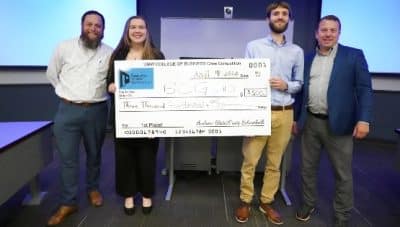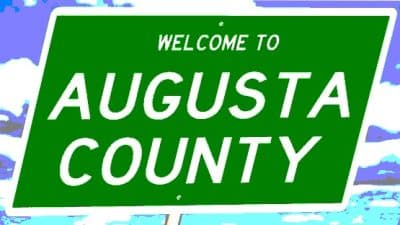James Webb has some explaining to do to Democratic Party voters in Virginia this spring.
But if he can wade through that minefield like he did through a long military career that included a tour of duty in Vietnam and a stint as Ronald Reagan’s secretary of the Navy, he just might end up giving United States senator and presumed 2008 Republican Party presidential frontrunner George Allen a serious run for his money in November.
“Virginia, being a red state, has seen moderate candidates like Mark Warner – like Harris Miller sort of appears to be, in the early stages – see some success. James Webb is almost carrying that trend even further – as a former Republican administration official, as a person with a strong military background. It’s something that has worked for Democrats so far – but he has to figure out a way to convince Democratic voters that he can be the one who gets the job done,” Matt Smyth, an analyst at the University of Virginia Center for Politics, told The Augusta Free Press.
It actually may not be as hard for Webb, who entered the race for the Democratic Party Senate nomination last month, to come out on top in his party-primary battle with Miller, a Northern Virginia businessman, as is being thought – given the noticeable level of support that is coming from the party’s grassroots at this early stage in the political game.
“It’s curious that Webb has gotten near-universal adoration and support from the Netroots – from the on-line grassroots – given that those Democratic activists tend to be more aligned with Harris Miller’s positions. I don’t know what to make of it. I can’t claim to understand it – particularly given that up until last week very few of Webb’s positions were even known,” said Waldo Jaquith, a Charlottesville-based political activist and blogger.
“This might indicate a well-educated Netroots – provided that it’s true that Webb will be the stronger candidate against Allen, as pundits like Larry Sabato have suggested. Maybe that’s true, but on the other hand, maybe this demonstrates that the Netroots are overly idealistic, too clever by half. I’m not sure,” Jaquith told the AFP.
Democratic Party activist and blogger Lowell Feld is one of the leaders of the Webb Netroots revolution. Feld helped launch a draft-Webb effort that got going last year after Webb indicated in an interview with The San Diego Union-Tribune that he had been “thinking about” running against Allen in the 2006 election.
“I think it’s pretty much a no-brainer. James Webb is an extraordinary, unique candidate that comes along very rarely. You just don’t see somebody like James Webb coming into the Democratic Party,” Feld told the AFP.
“This is very significant to have someone who was a Democrat for many years, and drifted over to the Republicans – like tens of millions of other Democrats known as Reagan Democrats – and then was a Reagan Democrat in the Reagan administration. And now he sees the Republican Party drifting far, far, far to the right on social issues and a lot of other things – and he’s not happy with it,” Feld said.
“He’s really going back to his Democratic roots – which is very significant, because it shows where the Republican Party is and where it has moved. And maybe where tens of millions of Reagan Democrats are at. If James Webb is representative to any extent of these Reagan Democrats, which I think he is, I think this can be very significant for the Democratic Party,” Feld said.
“Remember, the Democratic Party used to be a coalition of Northern liberals and Southern conservatives – and we lost that. I think here’s a chance to start to win that back,” Feld said.
Webb, perhaps demonstrating that he sees this as his trump card, is focusing his attention squarely on Allen – questioning the GOP stalwart’s allegiance to the “larger machine that is operative today in the Republican Party” in a speech in Richmond last week.
The strategy would be a good one if it were the fall, and the November election was just around the corner. But even with the support of many in the Netroots, winning votes in a Democratic Party primary by playing up the Allen-isn’t-Republican-enough card might prove to be a tough hand to play.
“The question that he has to answer to Democratic primary voters is that primary voters in either party tend to be the party stalwarts, the banner carriers of the party – and here’s a guy who, until whenever he declared a few weeks ago, nobody knew was a Democrat,” said Quentin Kidd, a political-science professor at Christopher Newport University.
“In fact, he has a history of not only serving under a Republican president, but he’s endorsed Allen before. His job is to explain to Democratic primary voters why he’s a Democrat – and why they should abandon somebody who’s been a long-term Democrat and support him in the primary,” Kidd told the AFP.
“Webb will have plenty of opportunities to make his case – that I was a Republican, and now I’m a Democrat, and here’s why I’m a Democrat. But I think Miller has an equal amount of opportunity – or greater opportunity – to make the case that I’ve always been a Democrat, and so you shouldn’t abandon me because Johnny-Come-Lately has decided to run against George Allen,” Kidd said.
A Miller campaign spokesperson raised that issue in a comment to The Roanoke Times last week about Webb’s entree into the party-nomination battle – “We welcome Jim Webb to the race, and we welcome him to the Democratic Party,” spokesperson Taylor West told the paper.
Miller’s press secretary, Brian Cook, told the AFP that Miller falls in a long line of successful Democratic Party candidates who have “focused on businesslike, results-oriented solutions.”
“I’m sure the primary campaign will be a spirited exchange of ideas – and we look forward to finding out where Mr. Webb stands on the issues that are important to Virginia’s families and to Virginia Democrats,” Cook said.
University of Mary Washington political-science professor Stephen Farnsworth thinks Miller will do well to put the spotlight on his business background.
“His business experience and his connections to Mark Warner could put him in good stead with Democratic Party voters,” Farnsworth told the AFP.
The Warner connection – evident in the makeup of the Miller campaign team, which is populated heavily with staffers from the Warner and Tim Kaine gubernatorial efforts of 2001 and 2005 – is a key factor in a state in which Warner’s approval ratings were in the 70-percent-plus range as he rode into the governor’s office sunset earlier this year.
But Webb can claim some significant Warner ties as well – in the form of campaign strategists Steve Jarding and Dave “Mudcat” Saunders. Jarding ran Warner’s ’01 gubernatorial campaign, and Saunders was one of the architects of the successful effort to appeal to rural voters.
With the Warner factor likely muted – Warner did cohost a fund-raiser for Miller last week, but he has not publicly endorsed either candidate – it’s really anybody’s guess as to how the primary campaign will play out over the next three months.
“They seem to be still feeling each other out right now,” Kidd said.
“If you listen to their comments about each other, the Miller campaign – rather than responding to the announcement that Miller was going to run in a critical way – said we welcome more Democrats to the party. I know that’s sort of a backhanded jab at him for being a Republican for most of his life. But neither campaign seems to be turning immediately to the negative,” Kidd said.
“And I don’t think they will – particularly because I don’t think that Webb can afford to run a negative campaign in a Democratic primary, since he already has to convince Democratic voters that he’s one of them, and running a negative campaign would be counterproductive in that context,” Kidd said.
(Published 03-13-06)










